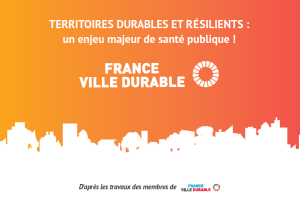How can public health and environmental issues be systematically included in the heart of the territorial strategy and the decisions made in defining projects? How can health imperatives be integrated into planning, design, and management for sustainable, resilient, and resident-friendly urbanism?
This document aims to answer these questions by presenting several ways to achieve sustainable urbanism, which is a priority for territories and serves as a tool for improving urban health.
This booklet is the result of a joint work by members from the 4 bodies of Sustainable City by France: actors from the public and private sectors, health professionals, territorial planners, as well as those involved in nature preservation, biodiversity, and ecosystems, within a working group called “Health and Sustainable Cities.” It is intended for all professionals.
Its objective is to bring together a number of recommendations, methodological elements, tools, and essential references that allow for the integration of health issues and determinants into a strategy for sustainable and resilient territories.
In short
“A state of complete physical, mental, and social well-being achieved and maintained throughout life, provided by healthy, enriching, and fulfilling living conditions and access to appropriate resources of quality, used responsibly and efficiently”: the concept of sustainable health, as defined at the Johannesburg Earth Summit in 2002 to complement the WHO’s 1946 definition, makes environmental issues a major public health concern.
Living in good health is regularly cited in opinion polls as one of the main concerns of the French population. However, when air pollution is responsible for 40,000 premature deaths each year in France, and the heatwave of summer 2022 leads to an additional 3,000 deaths, sustainable planning and the resilience of territories become a priority for public policies. It is therefore necessary to anticipate the consequences of urban choices on health-determining factors and prioritize options that promote the well-being of residents.
The highly visible effects of climate change and the exceeding of planetary boundaries make the debate even more imperative. They significantly exacerbate health risks – not to mention the threat of the collapse of our human societies – and provoke growing concern. Among those under 30, in particular, awareness of the dangers posed by climate change even translates into eco-anxiety (fear of the future) or solastalgia (distress in the face of loss), which are conditions that cause distress and depression. While healthy life expectancy does not take into account mental health aspects, it must be properly considered within the framework of urban policies.
In the era of the Anthropocene, addressing health issues has become paramount for cities and territories.
It was therefore natural for Sustainable City by France to delve into this issue and provide an overview of the available work and knowledge, as well as innovative initiatives and ideas that can enrich local planning policies.
Further information
This document is the outcome of the discussions carried out by the working group of SCbF, which brought together representatives from the government, local authorities, businesses, and experts. It is an operational deliverable, which aims to provide professionals with recommendations, tools, and methods for responsible digital practices that contribute to the ecological and social transformation of territories













